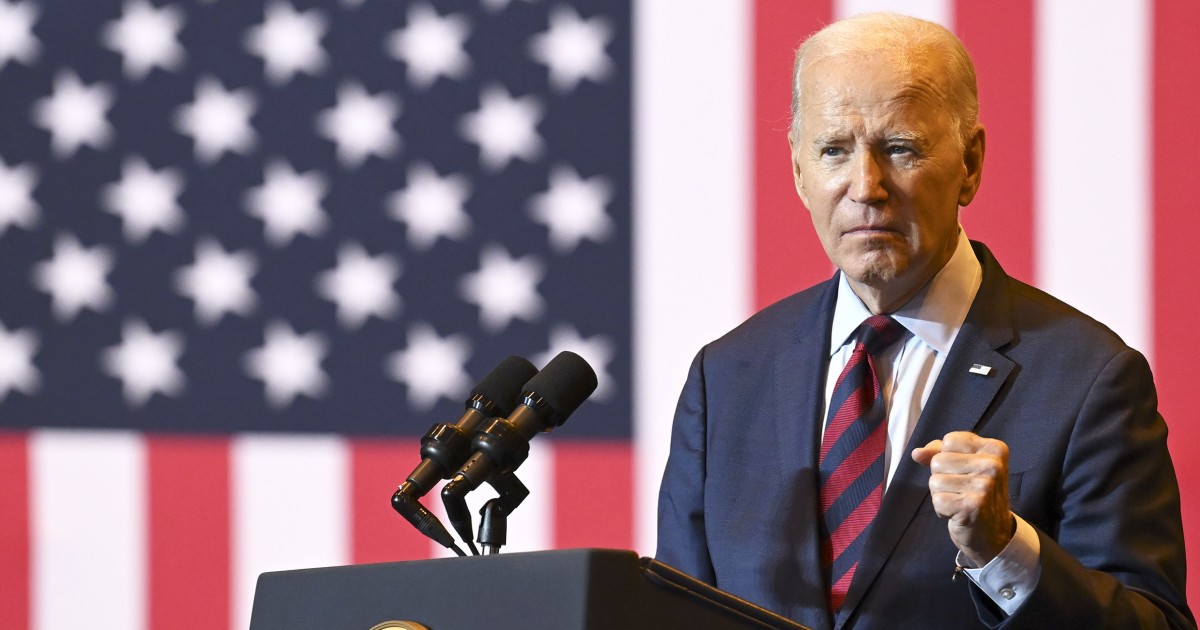White House officials say the administration’s hands-off position will not change, even as growing work stoppages threaten to upend American lives and complicate the economic case it wants to make to voters.
“Obviously, it’s better for the economy if we can have those kinds of win-win deals before there’s a strike deadline,” Celeste Drake, deputy director of the labor-focused National Economic Council, said in an interview before Biden spoke to a union-heavy audience here on Thursday. «But frankly, the president has repeated over and over again that he supports the right to strike.»
The president’s strategy toward the current labor disputes is a radical departure from how the White House handled a potentially crippling rail strike last year. In that case, administration officials directly mediated and ultimately forced a negotiated agreement between the carriers and a coalition of unions after several members of that coalition voted against ratifying it. That was a unique case, White House officials say, because the negotiations were taking place under the terms of the Railroad Labor Act, which required management involvement.
Drake, who previously served as a trade specialist for the AFL-CIO, argued that workers today «feel empowered to organize and bargain hard.» And White House officials are downplaying any chance that the disputes will undermine Biden’s recently intensified efforts to capitalize politically on lower inflation and a strong job market as he runs for re-election.
That said, strikes are, by their very nature, designed to disrupt the economy, officials acknowledge.
The Teamsters and UPS will resume negotiations sometime next week, facing a July 31 deadline to reach an agreement. If no deal is reached, it could be the largest single-employer work stoppage in US history. White House officials who had said a few weeks ago that they were confident a deal would now be reached are less certain.
“We told the White House, we took a strong position: my neighborhood where I grew up in Boston, if two people had a disagreement and you had nothing to do with it, you just kept walking. And we echoed the White House numerous times,” Teamsters president Sean O’Brien told wary members in a webinar this week. «The White House shouldn’t care about the Teamsters, they should care about corporate America… We’re not going to let anyone else implement a contract.»
In a sign that a contract agreement could be reached between the Teamsters and UPS before the Aug. 1 deadline, UPS released a statement Thursday that said, «We are prepared to increase our industry-leading wages and benefits.»
The resolution of one of the labor disputes would be good news for the White House, which another White House official described as having «different levels of commitment in each case.» On Wednesday, as UAW leaders arrived in the West Wing to brief senior staff on the status of negotiations, Biden asked to speak directly with UAW President Shawn Fain for an update, in what the White House describes as a «brief» meeting.
UAW did not respond to requests for comment.
Meanwhile, Acting Secretary of Labor Julie Su recently played an active role in helping finalize a tentative agreement between West Coast dockworkers and port operators.
Also this week, White House Chief of Staff Jeff Zients, Deputy Chief of Staff Natalie Quillian, and National Economic Council Director Lael Brainard went to the AFL-CIO headquarters near the White House to discuss with them and other union leaders «critical labor issues,» including how to ensure the administration implements key economic legislation to prioritize union work.
“The role of the federal government as a whole is to not get involved in every negotiation,” Drake said, adding that there are ways “we can help.”
“We are available to do that when both sides welcome us,” he added.
Major unions, many of which have backed Biden’s re-election campaign, feel the political tide has turned in their favor, especially after the Covid pandemic has put a new focus on working conditions and economic mobility. It’s not just traditional unions that are pushing the envelope, as previously non-unionized workers seek to do so.
On Thursday, Biden once again touted the good faith of his union. Speaking to an audience in a Philadelphia shipyard hangar with hardhatted workers looking on from the rafters, Biden listed how different unions in different states will manufacture the components for a new naval vessel being commissioned here to build offshore wind farms.
“Many of my friends in organized labor know that when I think of the weather, I think of jobs. I think union jobs are not a joke,» Biden said.
julie tsirkin contributed.

